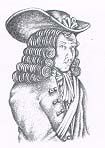|
Sid Meier's Pirates |
Historical Pirates |
Pirates In The Media |
Downloads |
Links |
Shop |
|
Historical Pirates
Pirates In The Media Downloads Shop Links Stories
|
|
Francis
Spriggs  Francis Spriggs sailed with Edward Low, as quarter master, for what appears to have been a good while, and possibly was part of the group that came with Low when he split from George Lowther. The schism with Low seems to have occurred around Christmas 1723, shortly after taking the Squirrel, a British man of war of 12 guns. Spriggs was given command of the ship, newly renamed the Delight. A quarrel ensued between Low and Spriggs over the disciplining of one of the band, and Spriggs and his small crew sailed away during the night. The crew of the Delight fashioned a black flag similar to Francis Low's and made sail for the West Indies. Encountering a Portuguese bark along the way they captured and plundered the ship and forced the crew through some minor torture, called a sweat, in which a ring of candles is lit in a circle around the mainmast and each crewman was made to enter the circle and run around the mast while the pirates poked and jabbed at them with pen knives, forks and such. This done the pirates set the Portuguese back upon their ship and set fire to it. Next the pirates took a sloop near St. Lucia, followed by a Martinico man, and vessel loaded with logwood. This last the plundered of all they wanted and tossed the remained into the sea. On the 27th of March 1724 they took sloop out of Rhode Island. About this time the pirates had received word of the death of King George II and were looking forward to the chance of securing a pardon in the next 12 months. Early April saw the pirates anchored off Rattan near the Bay of Honduras where the pirates put ashore many of the prisoners they had taken during their depredations. Lest you think the pirates were chivalrous in nature because of their freeing of the prisoners, know that while in their care these men had been the subject of much torture from outright cuts and stabs to being forced to eat plates of candle wax for the pirates amusement. After cleaning their ship on another island to the west of Rattan, the pirates set sail for the island of St. Christophers with the plan to fall upon a Captain Moor who commanding the Eagle sloop had attacked Lowther near Blanco. Upon reaching the spot they, instead, found a French man of war and not feeling up to the combat, the pirates ran from the encounter. The pirates made good their escape and soon took a schooner near Bermuda. The 4th of July 1724 found the pirates to windward of St. Christophers where they took a sloop. Again the crew seeking diversion tortured the captured crew by hoisting them as high as the main or top sails and swiftly let them down such that they broke many bones. Next cam a ship out of Rhode Island carrying horses. The pirates rode the horses around the decks, but after several mishaps, blamed the Rhode Islander's crew for bringing horses without boots and spurs such that the pirates could ride like gentlemen. After taking a sloop off Port Royal, Jamaica the pirates fled two British men of war, the Diamond and Spence. Escaping the ships and taking another sloop along the way, Spriggs sailed into the Bay of Honduras and took ten or twelve English vessels, but was soon chased off by a British man of war. After a trip to South Carolina, the pirates returned once more to the Bay of Honduras where they took sixteen more vessels. After facing the man of war mentioned above Spriggs managed an escape while losing the sister ship sailed by a Captain Shipton. The last news printed about Captain Spriggs is that as of April 1725 he had taken several more ships and was still at large. It can be seen from this little tale of about twelve or more months, the damage done to shipping and trade by just one pirate. It is little wonder that with peace in Europe the great powers would start to send increasing numbers of war ships to try to curtail the activities of the pirates. |
